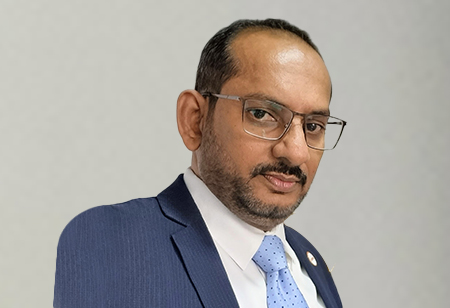Vijay Charlu, President, Corona Remedies

Vijay Charlu is a seasoned pharma industry professional with over three decades of experience in the industry. He came on board Corona Remedies in 2011, prior to which he has worked with companies such as Indoco Remedies, Abbott, Torrent Pharmaceuticals, Aurobindo Pharma, and Sun Pharmaceutical Industries across diverse functions and capacities. He engaged in a conversation with India Pharma Outlook magazine to inform about the modern management of chronic diseases by non-pharmacological and pharmacological interventions.
Today, the chronic disease management space is evolving at a faster pace than ever before. While chronic diseases have very limited treatment options, today, there has been a lot of transformation in this area on both technically advanced medical equipment as well as pharmacological management fronts. The intervention techniques, cardiothoracic surgical techniques, and neurological surgical techniques too have seen a lot of improvement lately, helping the patients today to recover much faster in chronic therapies. Also, newer drug therapies, new drug management techniques, and advanced pharmacological interventions are today giving better results for patients with lesser complications.
While there are a couple of challenges that we are currently facing, the first and foremost challenge is the reach to rural India. This is today seen as a major barrier for the entire healthcare fraternity. There are many villages in our country that face severe scarcity of qualified doctors, and a few villages don't even have the basic medical setup. If the private pharma companies can educate the Asha workers who are going door-to-door and enable them to stay connected with semi-urban cities, this challenge can be solved to a great extent.
Under non-pharmacological interventions, there are primarily two things. First is the diet habit and second is exercise. While there are a numerous diet therapies being practiced lately, it is important for people to eat good food that has the right amount of protein, carbohydrates, and fats. This will make them feel much better about themselves. However, just the right kind of food intake is not enough here; one needs to also do a lot of physical exercises, and they must make sure to change their food intake depending on the kind of exercise they are doing.
Under pharmacotherapy management, the patients have to strictly adhere to the medicines prescribed by their doctors. Secondly, early detection is a major concern in India, wherein over 50 percent of the population is not detected with chronic ailments. To summarize, proper diet, exercise, and the right detection of the program is the best way forward for chronic disease management.
Today, many companies have become very patient-centric in their go-to-market strategies. Additionally, many of them are also creating awareness among the people by educating them through various media channels where their specialist doctors speak about chronic diseases. In this way, this pharmacological industry can also help the government in its efforts to create awareness among the population. While a lot is already being done in this regard, there is still a long way to go for both the government and the pharmacological industry to enable detection among the rural population.
Every company has its own different strategic approach towards patient management and disease awareness programs. However, I feel the companies must be more integrated and look at the greater picture of how they can work together to make India a chronic disease-free nation. The public-private sector enterprises must support and coordinate with local medical authorities in smaller villages to make this idea a reality. The entire efforts and energy of the industry must go into economizing good quality products and making them more affordable so that the patients can continue taking their medication